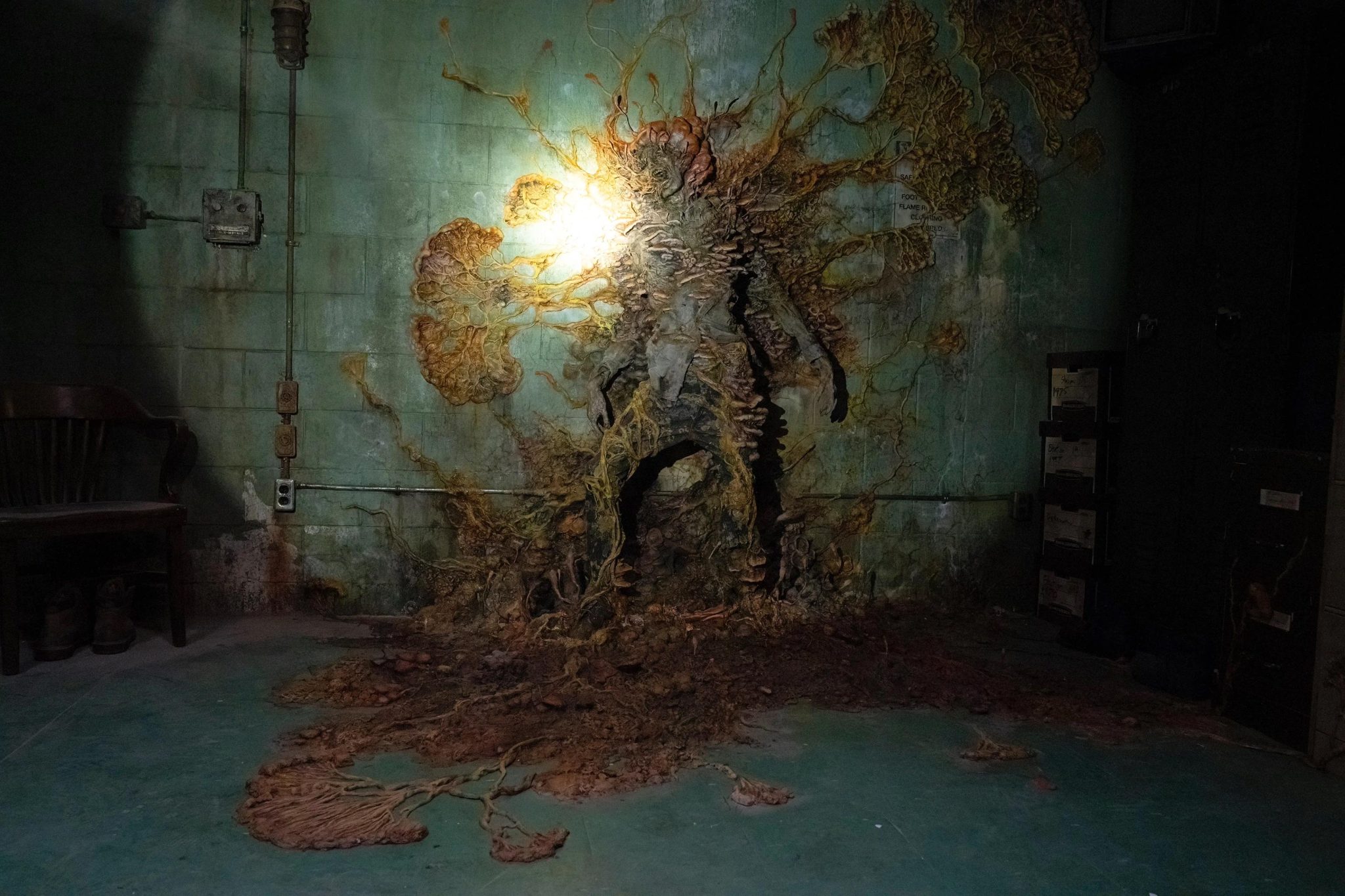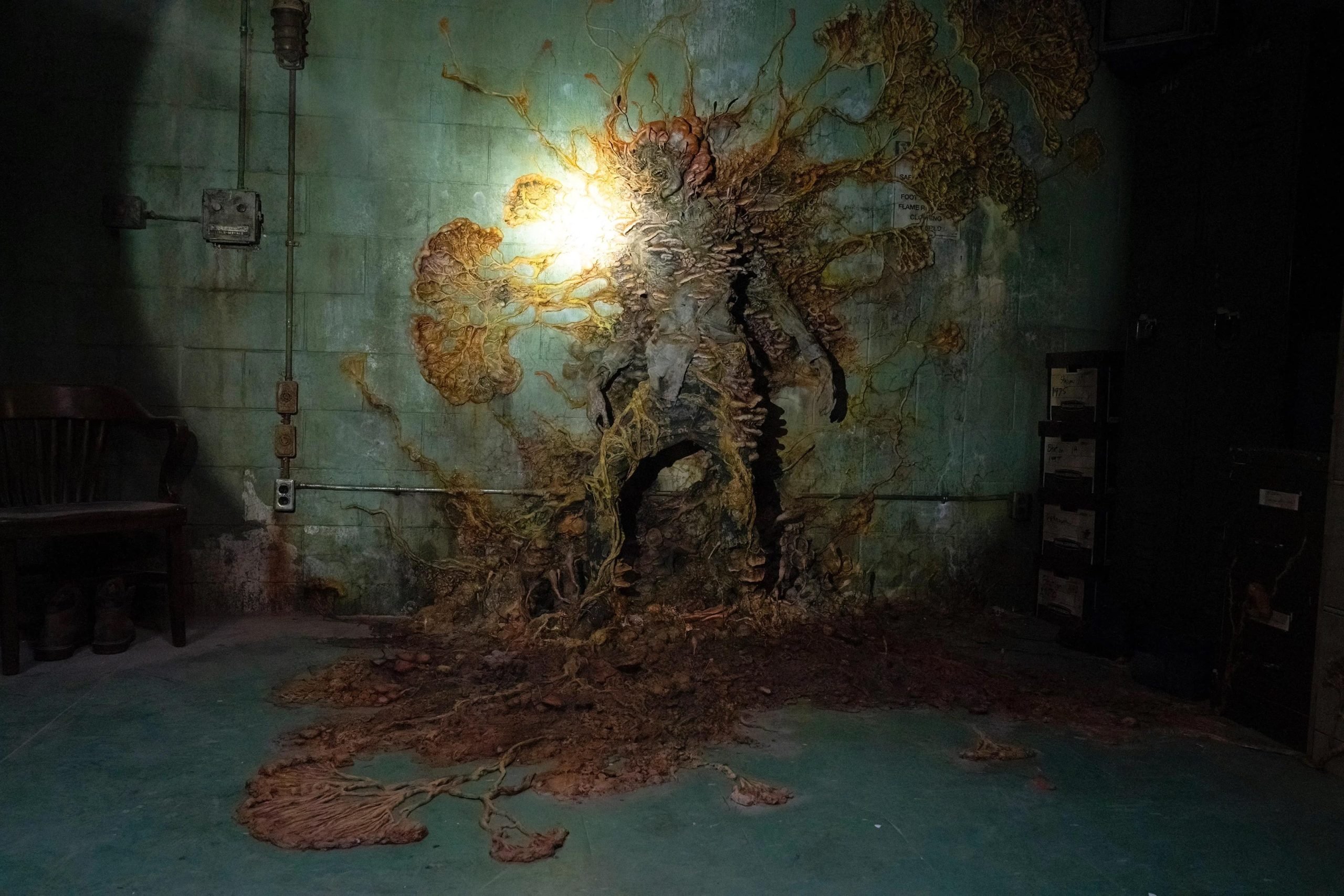
فطر زومبي بشري من البرنامج التلفزيوني “The Last of Us”. الائتمان: Liane Hentscher / HBO
لا يمكن تحويل الفطائر إلى زومبي كما هو الحال في فيلم The Last of Us على HBO ، لكن الفطريات الموجودة في العجين كانت تجعل الناس مرضى لفترة طويلة.
في سلسلة HBO “الأخير منا، “على اسم لعبة الفيديو الشهيرة التي تحمل الاسم نفسه ، فإن إمدادات الدقيق في العالم ملوثة بفطر. كورديسيبس. عندما يأكل الناس الفطائر أو غيرها من الأطعمة المصنوعة من هذا الدقيق ، تنمو الفطريات داخل أجسادهم ، وتحولهم إلى زومبي.
مثل عالم الغذاء، أنا أتفحص تأثير المعالجة على جودة وسلامة الفواكه والخضروات ، بما في ذلك الدقيق المستخدم في صنع الفطائر. بينما لن يتحول أحد إلى زومبي من أكل الفطائر في الحياة الواقعية ، غالبًا ما يكون الدقيق ملوثًا بالفطريات التي تنتج السموم الفطرية التي تصيب الناس بالمرض. ومع ذلك ، فإن المعالجة والطهي المناسبين سيحافظان على سلامتك بشكل عام.
https://www.youtube.com/watch؟v=uLtkt8BonwM
يستند فيلم The Last of Us إلى وباء يتسبب في انهيار كارثي بالعالم.
ما مدى انتشار العفن في الدقيق؟
يأكل الناس الخبز المصنوع من القمح حوالي 14000 سنة وزراعة القمح ما لا يقل عن 10000 سنة. في عام 1882 ، “مرض الخبز في حالة سكر“تم توثيقه لأول مرة في روسيا ، حيث أبلغ الناس عن الدوار والصداع ورعاش اليد والارتباك والقيء بعد تناول الخبز. قبل ذلك بوقت طويل ، ادعى المزارعون الصينيون أن تناول القمح الوردي – أحد الأعراض الرئيسية لعدوى العفن. Pusarium – لقد مرضوا. من الواضح أن الفطريات تجعل الناس مرضى لفترة طويلة.
يمكن أن يتأثر القمح والذرة والأرز وحتى الفواكه والخضروات بالفطريات أثناء نموها في الحقل. في كتابه The Last of Us ، يفترض عالم الأوبئة أن تغير المناخ يتسبب في تحور الفطريات ، وبالتالي يمكن أن تصيب البشر. الحقيقة المؤسفة هي أن الفطريات أصبحت مشكلة في السنوات الأخيرة درجة حراره حاميه شجع نموهم.
دراسة عام 2017 وجد أن أكثر من 90٪ من عينات دقيق القمح والذرة في واشنطن العاصمة تحتوي على فطريات حية. فطر الرشاشيات و Pusarium أهم أنواع القوالب في دقيق القمح Pusarium ينمو على القمح في الحقل ويسبب مرض نباتي زراعي شائع حمى رأس الفيوزاريومأو الجرب.
يستخدم المزارعون العديد من التقنيات للحد من هذا المرض النباتي المدمر ، قم بتنفيذ تناوب المحاصيل ، واستخدام أصناف مقاومة ومبيدات الفطريات ، وتقليل الري أثناء الإزهار. بعد الحصاد ، يقومون بفرز الحبوب لإزالة القمح الملوث قبل طحنه إلى دقيق. بينما يزيل الفرز معظم القمح الملوث ، فإن الكميات الصغيرة من الفطريات يمكن أن تحوله إلى دقيق.

الرشاشيات هي أحد القوالب الرئيسية الموجودة في دقيق القمح.
يقتل الكائنات الدقيقة في الدقيق
والخبر السار هو أن معظم الفطريات والكائنات الدقيقة الأخرى اخبز في 160-170 درجة فهرنهايت (71-77 درجة[{” attribute=””>Celsius). Pancakes are typically cooked to an internal temperature of 190-200 °F (88-93 °C). Other cakes and breads are cooked to internal temperatures anywhere from 180 to 210 degrees Fahrenheit (82-99 °C). So, unlike in “The Last of Us,” as long as you bake or fry your dough, you’ll have killed the fungi.
The problem comes when people eat the flour without cooking it first, such as by consuming raw cookie dough or “licking the bowl clean.” Both raw egg and raw flour can contain microorganisms that make people sick. The microorganisms that public health officials are most worried about are E. coli and Salmonella, dangerous pathogens that can cause severe illness.
Most people don’t realize that the flour they buy at the store is raw flour that still contains live microorganisms. Flour is rarely commercially treated to be safe to eat raw because consumers almost always cook flour-based foods. While consumers can also attempt to heat-treat raw flour at home, this isn’t recommended because the flour may not be spread thinly enough to kill all of the microorganisms.
Some fungi and microorganisms can create spores, which are like seeds that help them survive adverse conditions. These spores can survive cooking, drying and freezing. There are even 4,500-year-old yeast spores that have been reawakened and made into bread. These fungal spores rarely cause serious illness in people, except in those with weakened immune systems.
Chemicals can be added to food to stop fungal growth. These additives include sorbates, benzoates and propionates. However, you almost never see these additives in flour or pancake mix because fungi can’t grow in a dry powder. The fungi either grew on the wheat in the field or on the bread after it is baked. For that reason, you may see these additives in bread but not in a powdered mix.

It might be best to leave that moldy bread alone.
Mycotoxins
The biggest risk from fungi is not that it will grow inside our bodies, but that it will grow on wheat or other foods and produce chemicals called mycotoxins that can cause severe health problems. When wheat is harvested and ground into flour, mycotoxins can get mixed in.
Unfortunately, while normal cooking can kill the microorganisms, it doesn’t destroy the mycotoxins. Eating mycotoxins can cause problems ranging from hallucinations to vomiting and diarrhea to cancer or death. Some of the common mycotoxins found in grain include aflatoxins, deoxynivalenol, ochratoxin A and fumonisin B.
The oldest known case of mycotoxin poisoning is recorded as a disease called ergotism. Ergotism was mentioned in the Old Testament and has been reported in Western Europe since A.D. 800. It has even been suggested that the Salem witch trials were caused by an outbreak of ergotism that led its victims to hallucinate, though many have disputed this idea. Wheat is less likely than other grains to have dangerous mycotoxins, which is why some have proposed that declining mortality in 18th-century Europe, especially in England, was due to the switch from a rye-based diet to a wheat-based diet.
Ultimately, you don’t need to worry about eating those pancakes. Farmers use many techniques to minimize fungal growth and remove moldy grain, and the government keeps a close eye on mycotoxin levels during crop production and storage. Just make sure you cook your bakery products before eating, and don’t eat anything that has started to mold.
Written by Sheryl Barringer, Professor of Food Science and Technology, The Ohio State University.
This article was first published in The Conversation.

“متعصب للموسيقى. مستكشف متواضع جدا. محلل. متعصب للسفر. مدرس تلفزيوني متطرف. لاعب.”

